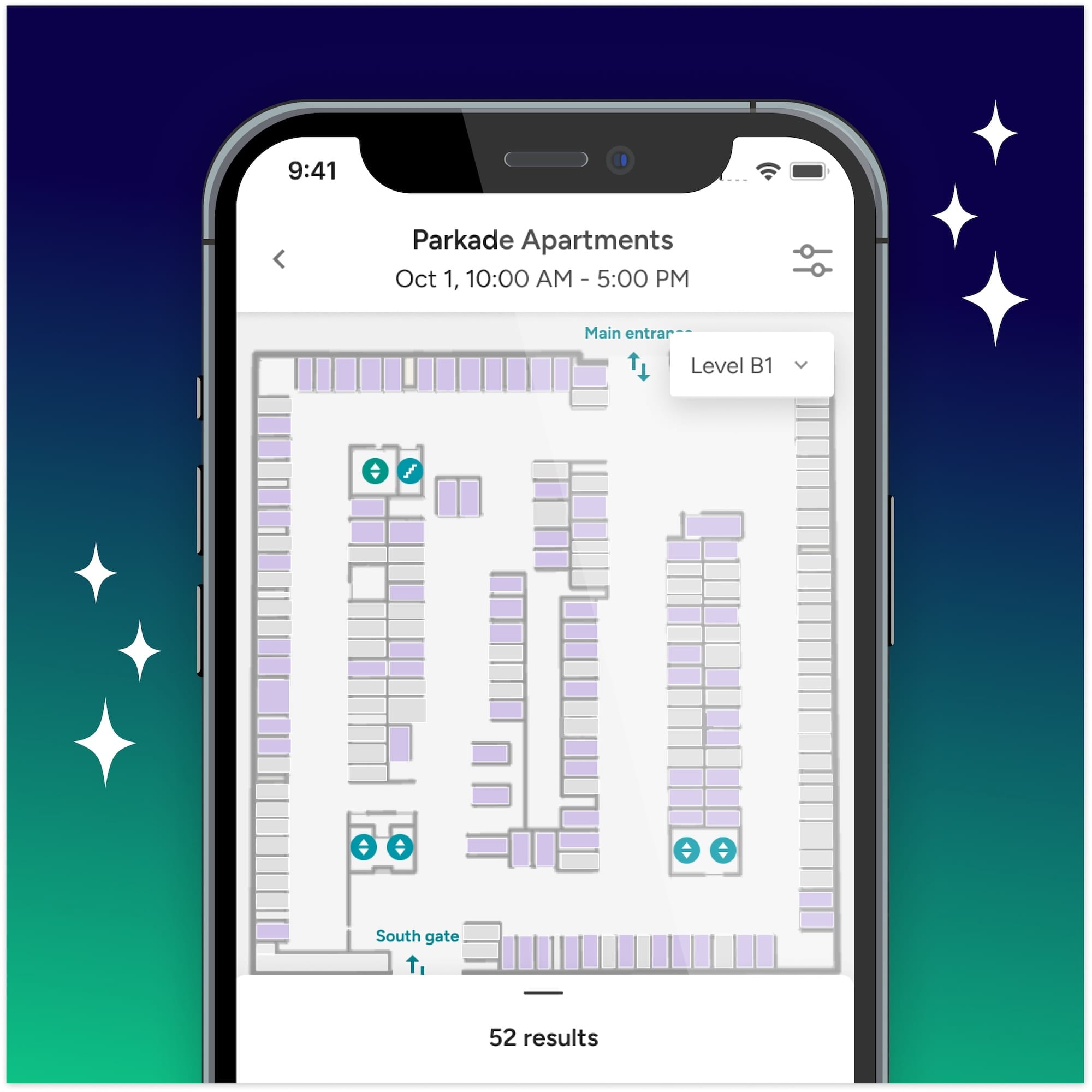

TABLE OF CONTENTS
Electric vehicles are becoming increasingly popular, and the demand for EV chargers is on the rise — especially in apartment and condo buildings.

There are two possible solutions when it comes to installing EV chargers in buildings:
Both solutions have their upsides and downsides. For example, installing the chargers in communal spots allows more people to use one charger. However, these spots can sometimes be unreliable, and something as simple as charging a car can end up being a bad user experience.
Placing chargers in assigned parking spaces, on the other hand, ensures a more reliable charging for whoever has that parking spot. However, such experience is limited to one user only.
To recap, here are the upsides and downsides of putting chargers in communal vs assigned spots.

Chargers are expensive, so ensuring high utilization of the chargers is core to maximizing the building’s investment in charging infrastructure.
Installing EV chargers in communal spots ensures that multiple EV owners get an opportunity to fuel their car. The usage of communal EV chargers is more likely to be maximized as several vehicles will get a chance to charge on a daily basis. EV chargers in assigned spots usually sit empty throughout the day (when their owners are away from home), and they simply turn into pricey personal EV parking spots.
For these reasons, communal EV chargers might seem like a much better solution. However, they can provide a subpar charging experience since these spots often tend to be abused and/or unreliable.
EV owners frequently leave their cars in these spots, even after their vehicles are fully charged, preventing others from keeping their EVs juiced. Some EV owners even see these spots sitting free, and park there even when they don’t need a charge — as they (perhaps somewhat justly) feel entitled to any EV parking spot.
Fortunately, this is a problem that’s easily fixed. by incentivizing EV owners to move their cars once they are fully charged.
What’s the best way to do that? Use Parkade.
Parkade is an easy-to-use app that allows buildings to manage their communal EV chargers better. The app can make every EV charging spot reservable, predictable, priced and highly utilized.
With Parkade, it’s easy to add a price to parking in a building’s EV parking spots for its tenants.
Pricing these parking spots on an hourly or daily basis, just like a building may for “visitor parking” spots, can make communal EV parking work much better for tenants and help buildings recoup the cost of the chargers.
Additionally, by using Parkade to charge a fee for parking, the spots could also be reservable in advance by tenants. This would give electric car owners a chance to use the chargers at a time that is most convenient for them. A system like this would make communal EV chargers as reliable as personal ones.
And, it would go a long way toward solving the biggest problem with EVs: range anxiety. Tenants would know before they arrive at work or home whether they’ll have a charger available.
A solution as simple as this will increase charger utilization, allowing buildings to install fewer chargers while making sure that all tenants get an opportunity to “fuel” their EVs.
Installing additional EV chargers in a building is a very pricey project. Chargers alone can cost thousands of dollars and buildings have to cover the cost of wiring, electrical upgrades, permits and labor as well.
For already-built condo and apartment buildings that don’t have communal parking, there’s often no other place to install new EV chargers other than in existing assigned parking spots. This undoubtedly results in a reliable charging experience, but only for whoever that parking spot is assigned to and their guests.
The privilege of owning an assigned EV parking spot comes at a steep price. In condo buildings, the assigned spot owners might have to pay for the charger on their own. The building usually pays for the installation in rental apartment buildings but charges the tenants a monthly fee for the EV parking.
In addition, assigned EV parking spots usually turn out to be a waste of a very expensive charger’s potential since it ends up being unused most of the time.
The good news is that Parkade can help maximize the utilization of assigned EV parking spots.
Those who have EV chargers in their assigned parking spots can make their charger available to others with the help of Parkade.
The app allows residents with an assigned EV parking spot to share their chargers with their fellow residents when they are not in use. In addition, owners of EV parking spots can charge others a small fee if they wish to help recoup costs.
This way, EV owners who live in the building would have more chargers at their disposal, and they wouldn’t have to go through the frustrating experience of constantly being on the hunt for a charger.
With the help of Parkade, every residential building will be able to provide their tenants with reliable EV charging spots. Whether your building goes the communal or assigned parking route for locating its EV chargers (or both!), the app is an excellent way to increase utilization and reliability ofEV chargers and defray the costs of installing the chargers.
Being able to find an EV charger without any trouble is one of the most important part of the dream of owning an EV. Parkade is here help to make those dreams come true.
.jpg)
As parking management becomes increasingly digital, security becomes critical — and we’re excited to share that we've achieved a major security milestone.
Read Story
We’re thrilled to announce one of our most significant leaps forward this year: the launch of dynamic maps across our mobile and web applications.
Read Story
Now that AB 1317 is official, it’s time to brush up on the requirements and see how your properties stand to benefit.
Read Story